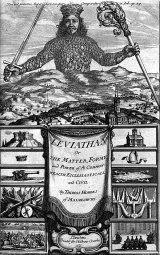Leviathan Page #13
Leviathan or The Matter, Forme and Power of a Common-Wealth Ecclesiasticall and Civil—commonly referred to as Leviathan—is a book written by Thomas Hobbes (1588–1679) and published in 1651 (revised Latin edition 1668). Its name derives from the biblical Leviathan. The work concerns the structure of society and legitimate government, and is regarded as one of the earliest and most influential examples of social contract theory.
These forms of Speech, I say, are expressions, or voluntary significations of our Passions: but certain signes they be not; because they may be used arbitrarily, whether they that use them, have such Passions or not. The best signes of Passions present, are either in the countenance, motions of the body, actions, and ends, or aims, which we otherwise know the man to have. Good And Evill Apparent And because in Deliberation the Appetites and Aversions are raised by foresight of the good and evill consequences, and sequels of the action whereof we Deliberate; the good or evill effect thereof dependeth on the foresight of a long chain of consequences, of which very seldome any man is able to see to the end. But for so far as a man seeth, if the Good in those consequences be greater than the evill, the whole chain is that which Writers call Apparent or Seeming Good. And contrarily, when the evill exceedeth the good, the whole is Apparent or Seeming Evill: so that he who hath by Experience, or Reason, the greatest and surest prospect of Consequences, Deliberates best himself; and is able, when he will, to give the best counsel unto others. Felicity Continual Successe in obtaining those things which a man from time to time desireth, that is to say, continual prospering, is that men call FELICITY; I mean the Felicity of this life. For there is no such thing as perpetual Tranquillity of mind, while we live here; because Life itself is but Motion, and can never be without Desire, nor without Feare, no more than without Sense. What kind of Felicity God hath ordained to them that devoutly honour him, a man shall no sooner know, than enjoy; being joys, that now are as incomprehensible, as the word of School-men, Beatifical Vision, is unintelligible. Praise Magnification The form of speech whereby men signifie their opinion of the Goodnesse of anything is PRAISE. That whereby they signifie the power and greatness of anything is MAGNIFYING. And that whereby they signifie the opinion they have of a man's felicity is by the Greeks called Makarismos, for which we have no name in our tongue. And thus much is sufficient for the present purpose to have been said of the passions. CHAPTER VII. OF THE ENDS OR RESOLUTIONS OF DISCOURSE Of all Discourse, governed by desire of Knowledge, there is at last an End, either by attaining, or by giving over. And in the chain of Discourse, wheresoever it be interrupted, there is an End for that time. Judgement, or Sentence Final; Doubt If the Discourse be meerly Mentall, it consisteth of thoughts that the thing will be, and will not be; or that it has been, and has not been, alternately. So that wheresoever you break off the chayn of a mans Discourse, you leave him in a Praesumption of It Will Be, or, It Will Not Be; or it Has Been, or, Has Not Been. All which is Opinion. And that which is alternate Appetite, in Deliberating concerning Good and Evil, the same is alternate Opinion in the Enquiry of the truth of Past, and Future. And as the last Appetite in Deliberation is called the Will, so the last Opinion in search of the truth of Past, and Future, is called the JUDGEMENT, or Resolute and Final Sentence of him that Discourseth. And as the whole chain of Appetites alternate, in the question of Good or Bad is called Deliberation; so the whole chain of Opinions alternate, in the question of True, or False is called DOUBT. No Discourse whatsoever, can End in absolute knowledge of Fact, past, or to come. For, as for the knowledge of Fact, it is originally, Sense; and ever after, Memory. And for the knowledge of consequence, which I have said before is called Science, it is not Absolute, but Conditionall. No man can know by Discourse, that this, or that, is, has been, or will be; which is to know absolutely: but onely, that if This be, That is; if This has been, That has been; if This shall be, That shall be: which is to know conditionally; and that not the consequence of one thing to another; but of one name of a thing, to another name of the same thing. Science Opinion Conscience And therefore, when the Discourse is put into Speech, and begins with the Definitions of Words, and proceeds by Connexion of the same into general Affirmations, and of these again into Syllogismes, the end or last sum is called the Conclusion; and the thought of the mind by it signified is that conditional Knowledge, or Knowledge of the consequence of words, which is commonly called Science. But if the first ground of such Discourse be not Definitions, or if the Definitions be not rightly joyned together into Syllogismes, then the End or Conclusion is again OPINION, namely of the truth of somewhat said, though sometimes in absurd and senslesse words, without possibility of being understood. When two, or more men, know of one and the same fact, they are said to be CONSCIOUS of it one to another; which is as much as to know it together. And because such are fittest witnesses of the facts of one another, or of a third, it was, and ever will be reputed a very Evill act, for any man to speak against his Conscience; or to corrupt or force another so to do: Insomuch that the plea of Conscience, has been always hearkened unto very diligently in all times. Afterwards, men made use of the same word metaphorically, for the knowledge of their own secret facts, and secret thoughts; and therefore it is Rhetorically said that the Conscience is a thousand witnesses. And last of all, men, vehemently in love with their own new opinions, (though never so absurd,) and obstinately bent to maintain them, gave those their opinions also that reverenced name of Conscience, as if they would have it seem unlawful, to change or speak against them; and so pretend to know they are true, when they know at most but that they think so. Beliefe Faith When a mans Discourse beginneth not at Definitions, it beginneth either at some other contemplation of his own, and then it is still called Opinion; Or it beginneth at some saying of another, of whose ability to know the truth, and of whose honesty in not deceiving, he doubteth not; and then the Discourse is not so much concerning the Thing, as the Person; And the Resolution is called BELEEFE, and FAITH: Faith, In the man; Beleefe, both Of the man, and Of the truth of what he sayes. So then in Beleefe are two opinions; one of the saying of the man; the other of his vertue. To Have Faith In, or Trust To, or Beleeve A Man, signifie the same thing; namely, an opinion of the veracity of the man: But to Beleeve What Is Said, signifieth onely an opinion of the truth of the saying. But wee are to observe that this Phrase, I Beleeve In; as also the Latine, Credo In; and the Greek, Pisteno Eis, are never used but in the writings of Divines. In stead of them, in other writings are put, I Beleeve Him; I Have Faith In Him; I Rely On Him: and in Latin, Credo Illi; Fido Illi: and in Greek, Pisteno Anto: and that this singularity of the Ecclesiastical use of the word hath raised many disputes about the right object of the Christian Faith.
Translation
Translate and read this book in other languages:
Select another language:
- - Select -
- 简体中文 (Chinese - Simplified)
- 繁體中文 (Chinese - Traditional)
- Español (Spanish)
- Esperanto (Esperanto)
- 日本語 (Japanese)
- Português (Portuguese)
- Deutsch (German)
- العربية (Arabic)
- Français (French)
- Русский (Russian)
- ಕನ್ನಡ (Kannada)
- 한국어 (Korean)
- עברית (Hebrew)
- Gaeilge (Irish)
- Українська (Ukrainian)
- اردو (Urdu)
- Magyar (Hungarian)
- मानक हिन्दी (Hindi)
- Indonesia (Indonesian)
- Italiano (Italian)
- தமிழ் (Tamil)
- Türkçe (Turkish)
- తెలుగు (Telugu)
- ภาษาไทย (Thai)
- Tiếng Việt (Vietnamese)
- Čeština (Czech)
- Polski (Polish)
- Bahasa Indonesia (Indonesian)
- Românește (Romanian)
- Nederlands (Dutch)
- Ελληνικά (Greek)
- Latinum (Latin)
- Svenska (Swedish)
- Dansk (Danish)
- Suomi (Finnish)
- فارسی (Persian)
- ייִדיש (Yiddish)
- հայերեն (Armenian)
- Norsk (Norwegian)
- English (English)
Citation
Use the citation below to add this book to your bibliography:
Style:MLAChicagoAPA
"Leviathan Books." Literature.com. STANDS4 LLC, 2024. Web. 24 Dec. 2024. <https://www.literature.com/book/leviathan_192>.




Discuss this Leviathan book with the community:
Report Comment
We're doing our best to make sure our content is useful, accurate and safe.
If by any chance you spot an inappropriate comment while navigating through our website please use this form to let us know, and we'll take care of it shortly.
Attachment
You need to be logged in to favorite.
Log In